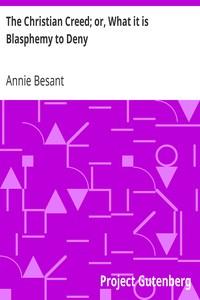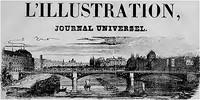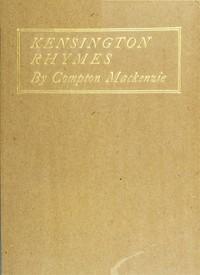|
|
Read this ebook for free! No credit card needed, absolutely nothing to pay.Words: 62947 in 8 pages
This is an ebook sharing website. You can read the uploaded ebooks for free here. No credit cards needed, nothing to pay. If you want to own a digital copy of the ebook, or want to read offline with your favorite ebook-reader, then you can choose to buy and download the ebook.

: Satires and Profanities by Foote G W George William Thomson James - Christianity Controversial literature; Rationalism@FreeBooksWed 07 Jun, 2023 PREFACE Believing as I do that James Thomson is, since Shelley, the most brilliant genius who has wielded a pen in the service of Freethought, I take a natural pride and pleasure in rescuing the following articles from burial in the great mausoleum of the periodical press. There will doubtless be a diversity of opinion as to their value. One critic, for instance, has called "The Story of a Famous Old Jewish Firm" a witless squib; but, on the other hand, the late Professor Clifford considered it a piece of exquisite mordant satire worthy of Swift. Such differences are inevitable from the very nature of the subject. Satire, more than any other form of composition, rouses antipathy where it does not command applause; and the greater the satire, the more intense are the feelings it excites. But which side, it may be inquired, is likely to be the best judge? Surely the friendly one. Sympathy is requisite to insight, as Carlyle says; while hostility blinds us to a thousand virtues and beauties. I am aware that many will take objection to the employment of satire at all, whether good or bad, on religious topics; but this seems to me preposterous, and I should readily answer it, if Thomson had not done so himself in the most vigorous and triumphant manner. Nearly all the pieces in this volume appeared originally in the National Reformer or the Secularist. I have attempted no arrangement of them, not even a chronological one; the compositor has shuffled them at his own sweet will. All I have done, besides collecting them and carefully reading the proofs, is to indicate in each case the year of first publication; and I think the reader will approve this plan as both modest and sensible. I am much mistaken if this volume does not become a well-prized treasure to many Freethinkers; that it will ever be valued by the general public I dare not hope. Yet the number of its admirers will increase with the growth of a healthy scepticism. It will not fall like a bombshell among ordinary readers, who serenely ignore the most terrible mental explosives, and render them comparatively innocuous by mere force of neglect; but it will startle and stimulate some minds, and in time its influence will extend to many more. What value Thomson placed on these pieces it is difficult to decide. "Working off the talent," he once remarked when I mentioned them. But the fact remains that he allowed one or two of them to be reprinted as pamphlets before any of his poems were collected in a volume. He naturally cared more for his poems than for his prose. What poet ever did the contrary? But even for these he cared little, except "The City of Dreadful Night" and a few others, which expressed his profoundest convictions. There were several articles in his "Essays and Phantasies" that proved Thomson to be a born satirist as well as a born poet; notably "Proposals for the Speedy Extinction of Evil and Misery," a tremendous display of sustained irony, to my mind unsurpassed even by Swift at his greatest, and with a poetic grandeur quite beyond him. The contents of this volume show marks of the same strong hand. There is never, perhaps, so continuous an exertion of power; but there is more versatility, more freedom, and often more abandon. I fancy, too, there is more rapidity and suppleness, and I am sure there is more mirth. Thomson's satire was always bitterest, or at any rate most trenchant, when it dealt with Religion, which he considered a disease of the mind, engendered by folly and fostered by ignorance and vanity. He saw that spiritual superstition not only diverts men from Truth, but induces a slavish stupidity of mind, and prepares the way for every form of political and social injustice. He was an Atheist first and a Republican afterwards. He derided the idea of making a true Republic of a population besotted with religion, paralysed by creeds cringing to the agents of their servitude, and clinging to the chains that enthral them. Mr. Dobell refers to the charm of Thomson's manner in social intercourse. His personal appearance told in his favor. He was of the medium height, well-built, and active. He possessed that striking characteristic sometimes found in mixed races--black hair and beard, and grey-blue eyes. The eyes were fine and wonderfully expressive. They were full of shifting light, soft grey in some moods and deep blue in others. They contained depth within depth; and when he was moved by strong passion they widened and flashed with magnetic power. When not suffering from depression he was the life of the company. He was the most brilliant talker I ever met, and at home in all societies; a fine companion in a day's walk, and a shining figure at the festive table or in the social drawing-room. But you enjoyed his conversation most when you sat with him alone, taking occasional draughts of our national beverage, and constantly burning "the divine weed." Thomson's sympathy with radical and revolutionary causes is not much noticed by Mr. Dobell, but it was very strong. He was secretary for some time to the Polish Committee in London, and his glorious lines on "A Polish Insurgent" which I for one can never read without tears, proves that he might have written the noble songs that George Eliot hoped he would compose. He sympathised with all self-sacrifice, all lofty aspiration, and in particular with all suffering. This last emotion was often betrayed by a look rather than expressed in words. I vividly remember being with him once on a popular holiday at the Alexandra Palace. We were seated on the grass, watching the shifting groups of happy forms, and exchanging appreciative or satirical remarks. Suddenly I observed my companion's gaze fixed on a youth who limped by with a pleasant smile on his face, but too obviously beyond hope of ever sharing in the full enjoyment of life. Thomson's eyes followed him until he passed out of sight, and the next moment our eyes met. I shall never forget the gentle sadness of that look, its beautiful sympathy that transcended speech, and made all words poor. THE DEVIL IN THE CHURCH OF ENGLAND The case was first tried in the Court of Arches, and the dean dismissed the suit and condemned Mr. Jenkins in costs, saying, "I am of opinion that the avowed and persistent denial of the existence and personality of the Devil did, according to the law of the Church, as expressed in her canons and rubrics, constitute the promoter 'an evil liver,' and 'a depraver of the Book of Common Prayer and Administration of the Sacraments,' in such sense as to warrant the defendant in refusing to administer the Holy Communion to him until he disavowed or withdrew his avowal of the heretical opinion, and that the same consideration applies to the absolute denial by the promoter of the doctrine of the eternity of punishment, and, of course, still more to the denial of all punishment for sin in a future state, which is the legitimate consequence of his deliberate exclusion of the passages of scripture referring to such punishment." So far, so well; the Church of England was assured of the Devil and the eternal punishment it has always held so dear. But Mr. Jenkins appealed to the highest court, and this has reversed the decision of the lower, admonished Mr. Cook for his conduct in the past, monished him to refrain from the like offence in future, and condemned him in the costs of both suits. Do you think, then, that the Church of England is authoritatively deprived of her dear Devil and her beloved eternal punishment? Not at all; the really important problem is evaded with consummate lawyerlike wariness; the points in dispute are most shiftily shifted like slides of a magic lantern; we have a new decision essentially unrelated to that which it cancels; we have a judgment which concerns not the Devil--except that he would chuckle over the too clever unwisdom which fancies it can extinguish "burning questions" with legal wigs. Free books android app tbrJar TBR JAR Read Free books online gutenberg More posts by @FreeBooks
: The Christian Creed; or What it is Blasphemy to Deny by Besant Annie - Christianity Controversial literature@FreeBooksWed 07 Jun, 2023

: L'Illustration No. 0033 14 Octobre 1843 by Various - Illustrated periodicals France L'Illustration@FreeBooksWed 07 Jun, 2023
|
Terms of Use Stock Market News! © gutenberg.org.in2025 All Rights reserved.






